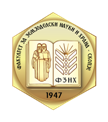FOOD COMPOSITION DATABASE IN MACEDONIA- NEED AND IMPORTANCE
Abstract
Food Composition Databases (FCDBs) represent fundamental information resources for nutrition science. The information is used for wide spectrum of purposes i.e. for food labelling, product development and innovation, dietary treatment, consumer information and research. Thus, high quality food composition data are fundamental to most issues related to nutrition and health and their importance is increasingly being recognized for agriculture, trade and economics. INFOODS is the International Network of Food Data Systems. It is a worldwide network of food composition experts aiming to improve the quality, availability, reliability and use of food composition data. Twenty-Eight European countries has developed the Food Composition Databases. The development of Food composition databases depends on the combination of the expertise of a diversity of specialists with professional background from agronomy, analytical and food chemistry, food technology, dietetics and nutrition to database and quality management and information technology. To support this European Food Information Resource (EuroFIR) has developed various training tools for the production and use of food composition data. However, many countries in Balkan region do not have any form of national food composition data or have been using borrowed information. This is a problem because people need essential information on food composition as well as an access to the information in order they can influence their own dietary patterns. Republic of Macedonia needs to move forward and improve the contribution to development of the FCDB and share it with different stakeholders. There is a need to prepare and implement measures like: increasing capacity development in generating and compiling food composition data; strengthen collaboration with other national and international bodies, organizations and projects working on food composition issues; incorporation of food composition into formal education curricula of schools and universities in nutrition, food science, dietetics and grants to various training and capacity building activities.
References
Charrondiere R. (2010). Development, evaluation and impact assessment of the Food Composition Study Guide, Dissertation University of Vienna.
Gurinovic, M., Mileševic J., Kadvan, A., Djekic -Ivankovic, M., Debeljak-Martacic, J.,Takic M., Nikolic, M., Rankovic, S., Finglas, P., Glibetic, ́M.(2016). Establishment and advances in the online Serbian food and recipe data base harmonized with EuroFIRTM standards. Food Chemistry 193. 30– 38.
Holcikova, K. (2000). CEECFOODS – Network on food composition for central and eastern European countries. Journal of Food Composition and Analysis, 13, 705–707.
Korošec, M., Golob, T., Bertoncelj, J., Stibilj, V., Seljak, BK. (2013). The Slovenian food composition database. Food Chem. 140(3):495-9.
Pavlovic, M., Pepping, F., Michal, D., Biro, L., Szabolcs, P., & Dimitrovska, Z., et al. (2009a). Turning Dilemmas into opportunities: A UNU/SCN capacity development network in public nutrition in Central and Eastern Europe. Journal of Nutrition Public Health Nutrition: 12(8), 1046–1051.
Pavlovic, M., Witthöft, C.M. Hollman P., Hulshof P.J.M., Glibetic, M., Porubska J., Pepping, F., Oshaug A. (2009b). Training and capacity building in central and eastern Europe through the EuroFIR and CEE networks. Food Chemistry 113 (2009) 846–850.
Pehrsson, P.R., Haytowitz, D.B. (2016). Food Composition Databases. Reference Module in Food Science. Encyclopedia of Food and Health, 16–21.
Porubska, J., Giertlova, A., Morochovicova, M., Kovacikova E., Porubsky, O. (2014). The Slovak national food composition database: New management system DaRiS. Journal of Food Composition and Analysis, 34:26–38.
http://www.eurofir.org/food-information/food-composition-databases-2/



